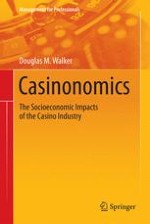2013 | Buch
Über dieses Buch
Casinonomics provides a comprehensive analysis of the economic and social impacts of the casino industry. Examining the latest cutting-edge research, with a mix of theory and empirical evidence, Casinonomics informs the reader on the most important facets at the forefront of the public policy debate over this controversial industry. While the casino industry has continued to expand across the United States, and around the world, critics argue that casinos bring negative social impacts that offset any economic benefits. Casinonomics examines the evidence on the frequently claimed benefits and costs stemming from expansions in the casino industry, including the impact on economic growth, consumer welfare, and government tax revenues, as well as gambling disorders, crime rates, and the impact on other businesses. Readers will come away with a better-informed opinion on the merits of these arguments for and against public policies that would expand casino gambling.
Anzeige
